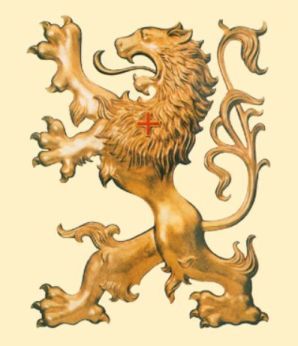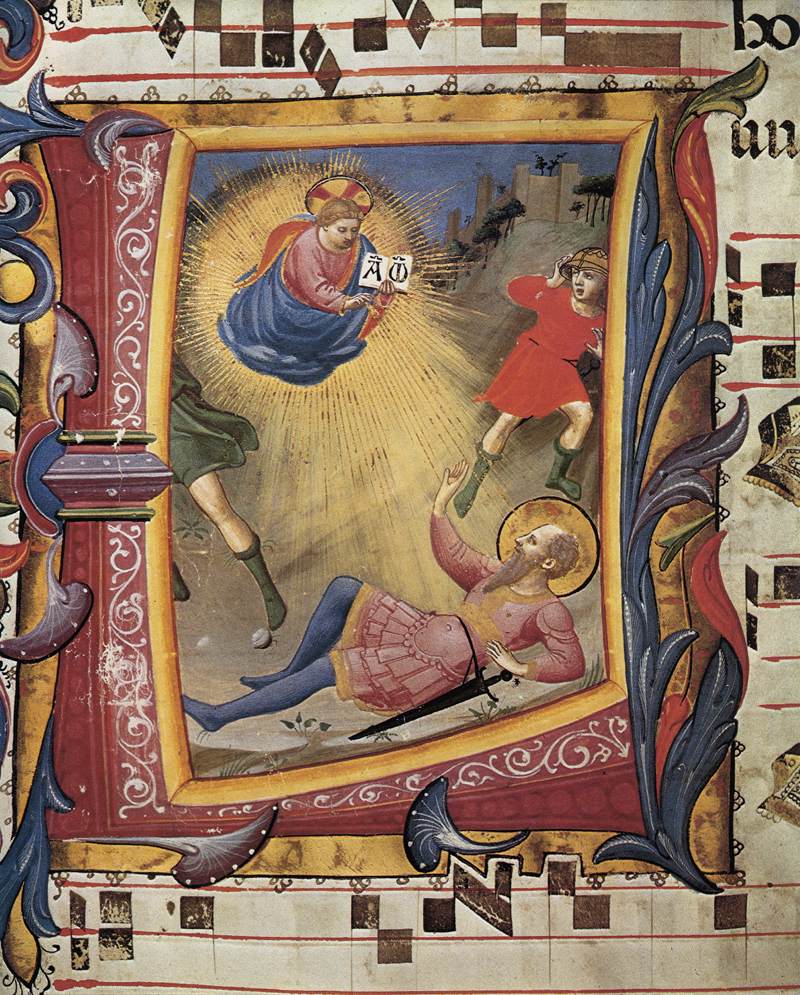|
Plinio Corrêa de Oliveira
The conversion of St. Paul and the spirit of the Apostles of the Latter Times
Saint of the Day – Monday, Jan. 25, 1965. Without authors' revisiton. |
|
|
I think it would be interesting to read and comment on today’s epistle. Today is the feast of the Apostle St. Paul, of his conversion, and the text lends itself to commentaries. Reading from the Acts of the Apostles: “And Saul, as yet breathing out threatenings and slaughter against the disciples of the Lord, went to the high priest, and asked of him letters to Damascus, to the synagogues: that if he found any men and women of this way, he might bring them bound to Jerusalem. And as he went on his journey, it came to pass that he drew nigh to Damascus; And suddenly a light from heaven shined round about him. And falling on the ground, he heard a voice saying to him: Saul, Saul, why persecutest thou me? Who said: Who art thou, Lord? And he: I am Jesus whom thou persecutest. And he trembling and astonished, said: Lord, what wilt thou have me to do? And the Lord said to him: Arise, and go into the city, and there it shall be told thee what thou must do. Now the men who went in company with him, stood amazed, hearing indeed a voice, but seeing no man. And Saul arose from the ground; and when his eyes were opened, he saw nothing. But they leading him by the hands, brought him to Damascus. And he was there three days, without sight, and he did neither eat nor drink. Now there was a certain disciple at Damascus, named Ananias. And the Lord said to him in a vision: Ananias. And he said: Behold I am here, Lord. And the Lord said to him: Arise, and go into the street that is called Stait, and seek in the house of Judas, one named Saul of Tarsus. For behold he prayeth. (And Saul saw a man named Ananias coming in, and putting his hands upon him, that he might receive his sight.) But Ananias answered: Lord, I have heard by many of this man, how much evil he hath done to thy saints in Jerusalem. And here he hath authority from the chief priests to bind all that invoke thy name. And the Lord said to him: Go thy way; for this man is to me a vessel of election, to carry my name before the Gentiles, and kings, and the children of Israel. For I will shew him how great things he must suffer for my name's sake. And Ananias went his way, and entered into the house. And laying his hands upon him, he said: Brother Saul, the Lord Jesus hath sent me, he that appeared to thee in the way as thou camest; that thou mayest receive thy sight, and be filled with the Holy Ghost. And immediately there fell from his eyes as it were scales, and he received his sight; and rising up, he was baptized. And when he had taken meat, he was strengthened. And he was with the disciples that were at Damascus, for some days. And immediately he preached Jesus in the synagogues, that he is the Son of God. And all that heard him, were astonished, and said: Is not this he who persecuted in Jerusalem those that called upon this name: and came hither for that intent, that he might carry them bound to the chief priests? But Saul increased much more in strength, and confounded the Jews who dwelt at Damascus, affirming that this is the Christ” (Acts, 9:1-23).
This story has been commented many times and is so rich in tasty details that we are almost at a loss for words. But one of the curious traits of this whole story is violence. The whole story is violent in its general outline and in its main details. Saul is a violent man. He takes the initiative to ask for warrants mandating persecution [of Christians] from the authorities of the Synagogue whom we perceive, very already biased. He was the zealous man who wanted to put an end to what he saw as the Christian heresy. So he takes the initiative to go ask for those warrants, meaning he is the one who triggers the theretofore somewhat sluggish action of the authorities and sets out to exterminate the many nuclei of the nascent pseudo-heresy. He sets out on his way armed with those warrants, that is to say, full of violence. The text says that he breathed violence and a desire of extermination; he leaves to Damascus to eliminate the new sect arising there. This violent man was famous for his violence. This fact becomes clear not only in the Acts but also in Ananias’ response to Our Lord. Ananias says: This man has a reputation for being very violent against us. In other words, he was considered a major enemy of Catholics. He takes the road to Damascus and the Acts use a curious expression to indicate that he marches furiously, breathing violence: And as he went on his journey, it came to pass that he drew nigh to Damascus. One has the impression that he was galloping on that long journey and his anger grew as he approached Damascus. Now, a violent event befalls this violent man. And the violence is nothing less than a voice that speaks to him, that is, from the order of things unseen, which starts with a warning: Saul, why do you persecute Me?! This question implies a violent reproach because Paul had been resisting a violence made to him – he was rejecting graces. “It is hard for thee to kick against the goad:” Grace was like a goad, a wind blowing upon him. Well then, as he rejected this grace that blew upon him, the goad goes full throttle to even greater violence: It throws him off his horse! For someone who is riding a horse, falling off is the greatest possible violence. He keenly felt this violence and immediately asked: “Lord what wilt thou have me do?" And yet an even greater violence befell him: he went blind! After falling of the horse and going blind, only death was missing, isn’t it? For a man with St. Paul’s temperament to go blind! Blindness is the human condition most incompatible with violence. A blind man is led by the hand by another, as a favor... he has no choice... You can imagine what it was like being led away to someone else’s house, that of Ananias, and then this fantastic scene which was the object of ‘spoken journals’ among Christians in Damascus: Saul is here! The news certainly circulated quickly in the Catholic community of Damascus, and a lot of people went to see Saul and talk to him. It was a momentous event. Saul is violent also dealing with himself: for three days he would not eat or drink: hard fasting. After the scales fell off his eyes and he began to see, the text curiously explains that he was very much comforted. He was not down even a bit; as soon as he recovered his sight, he rose up again and was ready to fight. But he had been completely changed: he is now a leader who will go to synagogues and public places to preach the name of Jesus Whom he had fought. He thus throws himself into the fight, bringing about a spectacular change in Church-synagogue relations. The leader of violence switches sides, turning all his violence against the other side. So this operation, which preceded the apostolate of St. Paul, is a very violent one. His was the “apostolate of violence”, not only because of his personal makeup but because it marked everything he did. Traveled only as a man who is capable of doing violence to himself could do. He faced risks that only a violent man faces. But all this is nothing close to the violence that his apostolate represented in the ancient world. The story is again repeated here – he was the leader of one side who switched to the other side. It is a kind of key position that changes place. Then this key man, in this key position, will act in the key area of the ancient world, which is the Mediterranean basin. And since to him the word of God was like a double edged sword that reaches even to the depths of the soul, to the juncture between soul and spirit, God gave him the grace of doing violence to souls. And he was capable of operating extraordinary conversions both by the quality of people he converted and for sheer number of people he converted, so that he opened a furrow that later became the groove on which the Catholic Church developed. And he later acted violently against the Roman Empire and took the first essential step towards the overthrow of paganism in the Roman Empire. Now, his final prayer has something violent too, of a kind of holy violence in relation to God our Lord. Because he addresses God and says something that most “white heresy” (a sentimental attitude that was demonstrated above all in a certain type of mawkish piety and masked as “charity” towards one’s neighbour) hagiographers and theologians would describe as a lack of humility. But since it is St. Paul, they have no choice but to keep quiet. As he was dying, it would have been legitimate for him to say: “Lord, have mercy on me according to thy mercy, and according to the multitude of thy mercies, efface my sin etc. Yet, he says, "Lord, I gave fought the good fight, now give me the prize of thy glory." It is a kind of brilliant certificate he gives his own fidelity, almost as if saying, "Lord, the account is full and I'm near the cashier, so give me my pay. My life has been worth the prize which thy justice promised me.” And he presents himself before God with a tranquil conscience. All this is precisely the opposite of one of the facets that “white heresy” presents. The “white heresy” mentality does not like violent conversions. It does not like to contemplate the conversions of wise men. It does not like to think about conversions of men who change the course of things. People with a “white heresy” mentality do not consider the body of the Church as a whole or human society as a whole in which there are key men, but they like little bitty individual conversions which are narrated thus: so and so had a very agitated sol, but he converted at a very suave hour, six o’clock in the evening, the hour of the Hail Mary! ... And the radio was playing some sugary music. He converted at that smooth and tender hour and had a great peace of soul and withdrew away from the hustle and bustle of all things human, and now he does nothing but pray. I even understand that a conversion could occur this way, because God's ways are many. But who could find it legitimate to present conversions only in this way? Furthermore, look at the head-on collision of St. Paul with his opponents, first in the synagogue and then in the Roman Empire. “White heresy” does not like collisions like these. It does not like men who have a word that is like a double edged sword that touches all the way to the junction of soul and spirit. They like people who give some advice that make the person feel more reassured, more serene. There was a very old priest here in Sao Paulo, a kind of a renowned man who was said to be the spiritual director of all the atheists of the city. Because they were those atheists of yore with a little bit of religion, and when they got bored or something they would to talk to him and would come out saying, You know, I have no faith, but he tells me such soothing words! ... I regret not having faith because religion is a great thing. I get out of there relaxed!” The word was not made to convert, but just to sweeten; it is a balm that you rub on a wound without healing it. This is more or less like a person who has a high fever and they give him sugar to suck, something sweet that distracts a bit from the bitterness of the fever. This priest, who is over ninety years old (if I am not mistaken), according to some reliable information I received the other day, had its clergyman suit already made because he wants to be one of the first priests of Sao Paulo to shed the cassock and don the clergyman. What we should ask St. Paul? Clearly, Our Lady obtained for him this gift of holy violence because he had many obstacles to overcome. It was an era of struggle in which it was necessary to overthrow paganism. We must also ask for this holy violence, to overthrow the Revolution now at its apex, much more powerful today than paganism was at the time of the Roman Empire. So it is easy to understand that the Apostles of the Last Days have a type of ‘violence’ a la St. Paul. Indeed, curiously, in some aspects, St. Paul can be considered forerunner of the Apostles of the Latter Times. One reads St. Louis Grignion’s Fiery Prayer, compares what it describes with what the Apostles and St. Paul were, and the analogies are enormous, there are lots of things that admirably relate to one another. Could we add still another consideration? It is a curious coincidence that the ultramontane movement in Brazil started in the city dedicated to St. Paul, and this movement is now radiating to other countries. One gets the impression that St. Paul wants that those born in his city to take that initiative. Besides, what was once called the “paulista” spirit, has something of a vigor, strength, fearlessness, initiative, sense of organization proper to people who must carry out a broad action in a universal sense.
Amador Bueno, un exemple of the Paulista Bandeirante The Paulista Bandeirantes were pioneers who naturally had, so to speak, some qualities that an ultramontane must have on the supernatural plane. But it is not licit to draw any major conclusions from this, as coincidences are not uncommon in history. But at any rate it is licit to ask a question or make a conjecture: Is this not a little more than a coincidence? It is quite possible. Anyway, it is only natural and just for us to remember today to pray especially to St. Paul asking him to give us his spirit, that is, the spirit of the Apostles of the Latter Times. |
|



